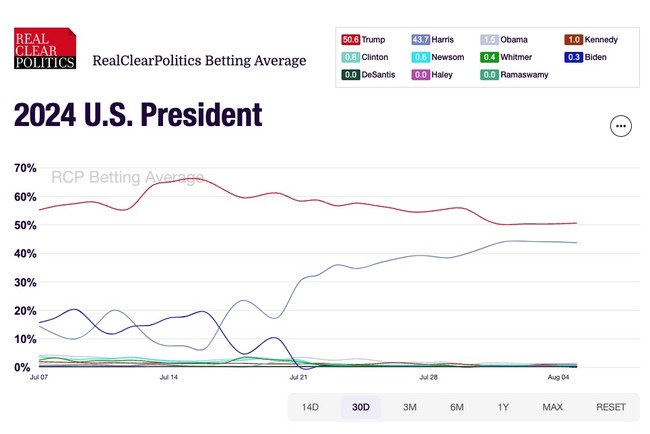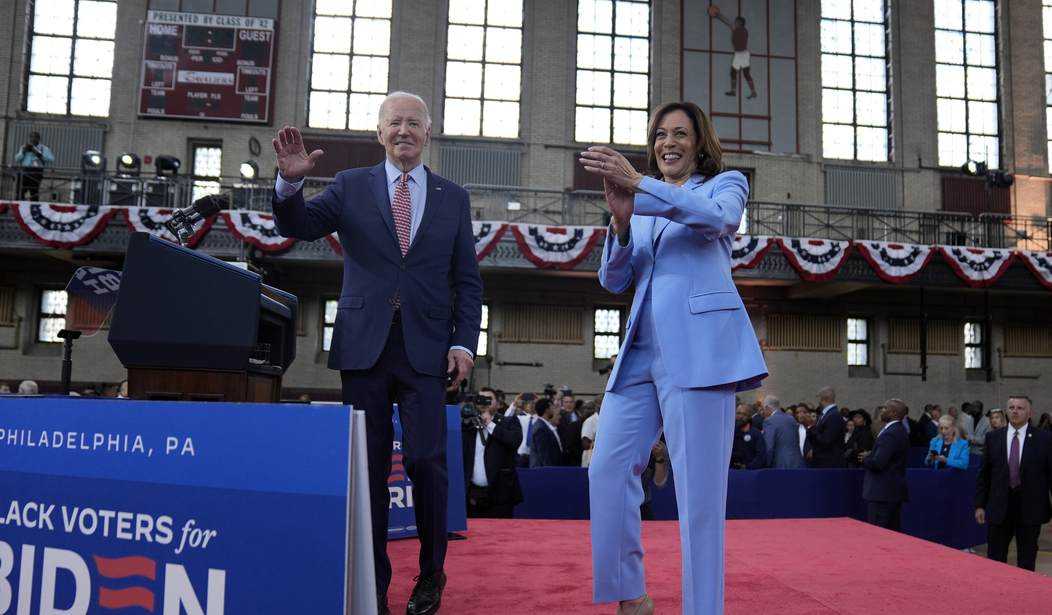Did the July jobs report signal an oncoming recession? Or has something else spooked stock markets around the globe? Like, say, a regional war in the Middle East? Or maybe a bad election outcome in the US?
After the Nikkei index tumbled 12% -- its worst day in 27 years -- the US markets took a dump this morning too:
In early trading, the Nasdaq Composite tumbled more than 4%. The S&P 500 fell more than 3% and the Dow was around 2.6% lower.
Turbulence started in Japan, with the Nikkei 225 falling more than 12%, its worst one-day drop since the crash after Black Monday in 1987. Losses cascaded across Europe and the U.S., as investors dumped riskier assets and flocked to safety.
The declines extended what has been a dizzying few days on Wall Street during which this year’s most popular trades have been aggressively unwound.
The fall didn't start this morning, as an interactive chart on CNBC shows. The DJIA peaked on Thursday and then began falling from its peak at 41,193 and some change. By closing on Friday, the DHI had lost nearly 900 points; now it's down nearly 2600 points since the Thursday close, and apparently is still falling.
CNBC believes the shock of the large miss in the unemployment report on Friday is driving the losses. But AI trading could be partly to blame too:
Fears of a U.S. recession were the main culprit for the global market meltdown after Friday’s disappointing July jobs report. Investors are also concerned that the Federal Reserve is behind in cutting interest rates to bolster an economic slowdown, with the central bank choosing instead to keep rates at the highest in two decades last week.
There’s also an unwinding of the once-hot artificial intelligence trade going on. Tech shares were among the worst performers Monday:
- Nvidia tumbled 9.6% Monday after going into the session already down more than 23% from its recent high.
- Apple cratered more than 5% after Warren Buffett’s Berkshire Hathaway cut its stake in the iPhone-maker in half.
- Other losers included Tesla, down 10%, and Broadcom and Super Micro Computer down 7% and 12%, respectively.
Is this a crash, or is this a correction? CNBC analyst and Fundstrat managing partner Tom Lee thinks it might be the latter. Lee chooses his words carefully here, but he suggests that we're seeing a kind of "growth scare" or perhaps even an overreaction to an "aberration" in Friday's jobs results. He also thinks this may be a signal to the Federal Reserve that they've waited too long to cut rates:
On the other hand, CNBC also notes that Wall Street's "fear gauge" is at the highest level seen since the beginning of the pandemic. That could indicate a sustained downturn in the markets, although its level improved a bit this morning:
A key measure of expected volatility in the stock market surged to its highest level in more than four years on Monday morning as global equities fell sharply.
The Cboe Volatility Index, or VIX, briefly broke above 65 on Monday morning, up from about 23 on Friday and roughly 17 a week ago. It had cooled to about 42 shortly after 10 a.m. ET.
This is the highest level the VIX has hit since March 2020, shortly after the Federal Reserve’s emergency actions during the Covid-19 pandemic, according to FactSet. The VIX rose as high as 85.47 in March 2020, according to FactSet.
The VIX is calculated based on market pricing for options on the S&P 500. It is designed to be a measure of expected volatility over the next 30 days, and is often referred to as Wall Street’s “fear gauge.”
Until Friday, the highest score this on the VIX was 18.71. Friday it closed at 23.29, and as of 10:15 this morning was at 42.35 after peaking at 65. Lee mentions this briefly in the above video. He's looking for a rapid fall in the VIX, which would indicate a quick recovery in the markets. So far there's not too much evidence of a steep fall after the steep ascent, but cooler heads may prevail once the previous irrational exuberance gets worked out of the AI trading valuations.
Needless to say, though, the timing couldn't be more inconvenient for Joe Biden and Kamala Harris. Both are trying to sell Bidenomics as a success story, while voters remain strongly resistant to that message. A Wall Street collapse won't make that sell any easier. A lot of people have their retirement planning tied up in stocks and bonds, and those people are already feeling a hard squeeze from three years of high inflation.
Donald Trump apparently thinks it's not just bad luck for Harris, but caused by her:
"Of course there is a massive market downturn. Kamala is even worse than Crooked Joe. Markets will NEVER accept the Radical Left Lunatic that DESTROYED San Francisco and California, as a whole," Trump posted on Truth Social. "Next move, THE GREAT DEPRESSION OF 2024! You can’t play games with MARKETS. KAMALA CRASH!!!"
"VOTERS HAVE A CHOICE — TRUMP PROSPERITY, OR THE KAMALA CRASH & GREAT DEPRESSION OF 2024, NOT TO MENTION THE PROBABILITY OF WORLD WAR lll IF THESE VERY STUPID PEOPLE REMAIN IN OFFICE. REMEMBER, TRUMP WAS RIGHT ABOUT EVERYTHING!!!" he added.
Well, maybe. But if the markets rebound, Trump might regret handing Harris an opportunity to take credit for it.
Update: Maybe there's more to the Kamala Crash theory than I first thought. The downturn began on Thursday, and coincidentally or not, that's when the betting markets narrowed dramatically on chances of a Harris win:
 And of course, this hasn't aged well at all, as Twitchy noted this morning:
And of course, this hasn't aged well at all, as Twitchy noted this morning:
Four years ago today, Trump claimed the stock market would “crash” if Joe Biden was elected
— Kamala HQ (@KamalaHQ) May 24, 2024
(The stock market has reached the highest levels ever recorded in history under President Biden) pic.twitter.com/4ZXsmtgh7z
So Harris picked this fight first. And while this is a correlation, one can argue that it's at least potentially causative.







Join the conversation as a VIP Member